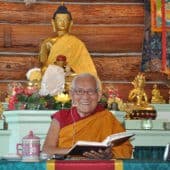Like cattle intended for slaughter,
Death is common to all.
Moreover when you see others die
Why do you not fear the Lord of Death?
Blinded by desire they do not see
Sensuality’s faults, like a leper scratching.
Those free from desire see the infatuated
As suffering like the leper.
About the author
Aryadeva, said to have lived between the second and third centuries CE, was a native of what is now known as Sri Lanka. The heart disciple of Nagarjuna, Aryadeva was a learned scholar, debater, and teacher at Nalanda monastery in India. The Tibetan canon contains many works on sutra and tantra attributed to Aryadeva.
Teachings highlighted in bold are listed at the bottom of the page.
Who it’s for
Aryadeva’s Four Hundred Stanzas provides a comprehensive layout of the Buddhist world view as well as an in-depth presentation of the Middle Way philosophy of ultimate reality. These teachings are appropriate for new and seasoned students of Buddhism alike.
About the text
Four Hundred Stanzas is both a commentary and supplement to Nagarjuna’s Treatise on the Middle Way. The text devotes much time to illuminate the meaning of Nagarjuna’s assertion that the Middle Way teachings on emptiness present a path that leads to full awakening.
The text also provides in-depth refutations of non-Buddhist tenet systems not addressed in Nagarjuna’s writing, and an in-depth explanation of those parts of the path to awakening associated with conventional truths.
Four Hundred Stanzas on the Middle Way is divided into 16 chapters of 50 verses each. The first eight chapters explain the stages of the path to awakening dependent on conventional truths. Subjects covered include:
- The main topics for meditation on impermanence and death
- Understanding the nature of the body to be unclean and a source of pain
- Learning to apply antidotes to disturbing states of mind
- The qualities of the Buddha’s enlightened mind and enlightened activity
- The practices of bodhisattvas
- Rebirth, renunciation and karma
- Preparing oneself to be a good student
Having led us to an understanding of conventional reality, the second eight chapters focus on ultimate truth. Aryadeva presents various lines of reasoning to help us understand emptiness, the Buddhist doctrine of how things really exist: that things lack inherent existence, but instead exist dependently. Subjects covered include:
- Refutation of self, space, time, particles, and liberation as permanent functional things
- Refutation of erroneous concepts of the self
- The selflessness of phenomena
- Becoming a suitable vessel for teachings on emptiness
- Understanding that things do not exist as they appear
- Overcoming the two extremes of absolutism and nihilism
- Refutation of inherent production, duration and disintegration
- Refuting various misconceptions regarding the teachings on emptiness
Teachings
Geshe Yeshe Thabkhe, who taught Aryadeva’s 400 Stanzas at Sravasti Abbey on an annual basis from 2013 to 2017, shared the insights that arise from prolonged familiarity and exploration of the subject matter: Aryadeva’s 400 Stanzas with Geshe Yeshe Thabkhe (2013-2017).
Venerable Thubten Chodron gave a series of teachings on 400 Stanzas between 2013 and 2015, grounding these teachings with practical advice on how to implement them in daily living: Aryadeva’s 400 Stanzas on the Middle Way (2013-15).
If the future is produced
Why is it not present?
If it is unproduced
Is the future permanent or what?
If a thing did not depend
On anything else at all
It would be self-established,
But such a thing exists nowhere.
Related Series

Aryadeva's 400 Stanzas with Venerable Thubten Chodron (2013-15)
Commentary by Venerable Thubten Chodron on Aryadeva’s Four Hundred Stanzas on the Middle Way to prepare for Geshe Yeshe Thabkhe's teachings.
View Series
Aryadeva’s 400 Stanzas with Geshe Yeshe Thabkhe (2013-17)
Teachings by Geshe Yeshe Thabkhe on Aryadeva’s Four Hundred Stanzas on the Middle Way given at Sravasti Abbey and Tibetan Buddhist Learni...
View Series
Aryadeva’s “400 Stanzas on the Middle Way”
Aryadeva's teachings on conventional reality and ultimate truth.